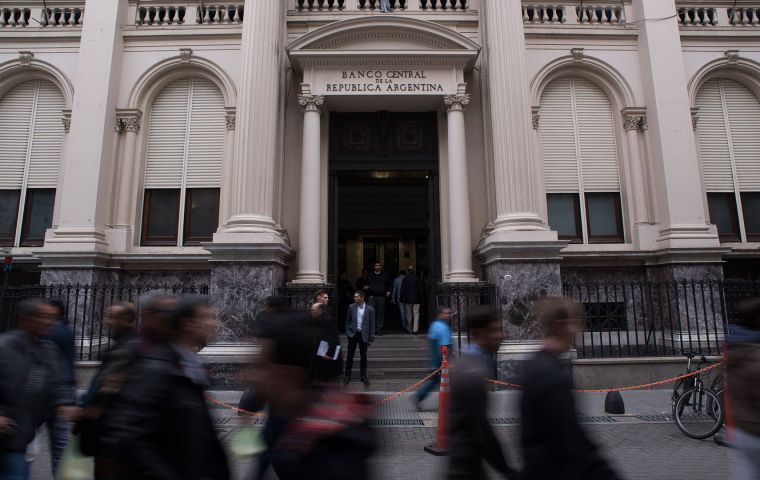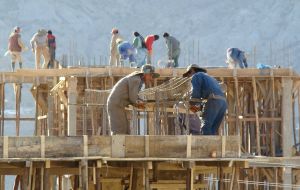MercoPress. South Atlantic News Agency
Argentina central bank holds benchmark rate at 27.25%; economy expands 4.7% in first two months
 The central bank said that inflation would begin to fall in May after a series of hikes in regulated prices end this month
The central bank said that inflation would begin to fall in May after a series of hikes in regulated prices end this month Argentina’s central bank held its benchmark interest rate at 27.25% on Tuesday, reiterating in a statement that high-frequency indicators suggested core inflation would remain high in April, but below March levels.
The bank said that inflation would begin to fall in May after a series of hikes in regulated prices end this month. It said several factors, including salary negotiations, supported the bank’s target of 15% inflation this year. The statement said if inflation fell slower than expected in coming months the bank would raise its policy rate.
Consumer prices in Argentina rose 2.3% in March, slightly down from the 2.4% increase in February. Twelve-month inflation was 25.4%, the same level as February.
The bank said in its twice-monthly policy statement it did not expect significant depreciation of the peso currency in the coming months, after it sold over US$ 2 billion in reserves this year to halt the peso’s slide.
Other economic data from Argentina indicated a trade deficit of US$ 611 million in March, compared with a US$ 910 million deficit in the same month last year, according to an Indec release on Tuesday. It was the country’s 15th consecutive month with a trade deficit. In February the deficit was US$ 914 million.
Likewise Indec reported that the economy expanded 5.1% in February when compared with the same month last year, marking the twelfth straight month of inter-annual growth. However the economy contracted 0.2% in February compared with January. This means the economy expanded 4.7% in the first two months of this year.
Retail, manufacturing, real estate and construction were the most dynamic sectors in February compared to twelve months before. Construction expanded 12.7%; retail, 7.9% and financial services 7.4%. Other eleven positive sectors include manufacturing 5.8%; transport and communications 1.7%; agriculture and livestock, 2.4%; public administration 1.3%; hotels and restaurants 2.8%; mines and quarries 1.7%; education 1.3%; social and health services 1.3%; community and personal services 1% and public utilities, power, gas and water 0.9%. Fisheries was one of the sectors that had negative growth during February.





Top Comments
Disclaimer & comment rules-

Read all commentsA nice, rosy picture that appears to show Argentina peacefully sailing towards a paradise of economic well being.
Apr 28th, 2018 - 03:26 pm -1Alas, the optimistic statistics presented above conveniently omit major indicators showing a very different picture.
In the last week alone, Argentina's Central Bank had to resort to record sales of U.S. currency to rescue the peso from a catastrophic freefall. As many as US$ 5 billion--an amount never seen before--had to be sold to keep the greenback at just over $20 pesos.
Stubborn inflation, high fiscal deficit, massive borrowing, the dismantling of the domestic productive sector due to reduced consumption, massive imports and increased energy costs are making a serious dent on people's expectations and impacting president Macri's public image.
In the meantime, judges send (again) to jail two businessmen linked to the past government to conveniently push negative economic headlines out of the newspapers' front pages.
Commenting for this story is now closed.
If you have a Facebook account, become a fan and comment on our Facebook Page!